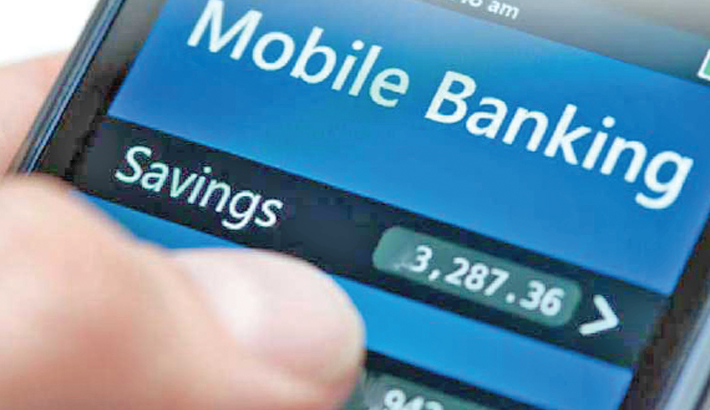Mobile Banking Taking Base

Needless to say, banking plays a silent, yet significant part in our day-to-day lives. The fundamental concept on which banking is based is a business activity of accepting and safeguarding money owned by individuals and entities, and then lending out this money in order to earn a profit.
However, with the demand of time, more appropriately with the propensity for adopting digital transformation, banking activities have taken a new direction and more and more innovative services are being introduced in thesector day by day.
Mobile banking is one of such trends, which virtually has shaped the banking activities in terms of instantaneous service delivery with greater transparency.
According to Juniper Research- a leading group for online and telecom business and marketing research- by 2021, nearly 3 billion users will be using retail banking services on smartphones, tablets, PCs and smartwatches, up 53% from 2017. It also predicts that usage will continue to rise as consumers increasingly opt for banks offering the convenience of rapid, multi-channel digital services. This indicates that banks will need to focus on providing a more frictionless digital experience to their customers, especially if they are to remain market leaders
In developed states, soaring smartphone sales, more mobile internet use, an explosion of banking and shopping apps, and expanded network coverage are credited with the burgeoning growth in mobile banking. Latest Google research shows tech savvy Australians are leading the way when it comes to smartphone banking. It suggests Aussies are 65 per cent more likely than the British to do banking via their smartphone and 14 per cent more likely than Americans. In addition, six in ten Australians now own a smartphone — a penetration rate also higher than the United States and Britain. Transferring funds online was most common, followed by bill payment, online auctions, online payment or money transfer systems, and credit card purchases.

In Bangladesh, in line with the current trend of transforming into digitalisation, banking sector are also getting fresh impetus to launch various modern services including mobile financial services (MFS) for its clients. With an aim to provide financial and banking services to the people at an affordable cost, Bangladesh has been following bank-led MFS as it is easy to monitor corrupt practices and catch the culprits, says a Bangladesh Bank (BB) official. In a recently concluded seminar jointly organised by BB and SAARCFINANCE, BB governor disclosed that 25 banks have so far obtained permission for MFS operation of which 18 have launched their services. There are about 39 million registered MFS customers in the country transacting around Tk 7 billion per day.
Statics from a news report shows that the total number of bank accounts in the country is about 9 crore. Of them, 2.5 crore are mobile banking accounts, 5.5 crore traditional and another 1 crore Tk 10 farmers’ account exist in the state owned banks. Interestingly, it took decades for the conventional accounts to reach that figure, while mobile banking accounts took only a few years since its inception. This implies the positive trend towards embracing the digitised banking by the common people of the country. This is corroborated by the fact that different sectors including garment industries, remittance, pharmaceuticals, airways, utilities, mutual funds, super food outlets, insurance companies, fertilizer and steel are exploiting electronic banking, and there is hardly any corporate segment that remains untouched by mobile and internet banking. Again, from retail superstores to distributors’ networks to tech-start-ups to e-hailing taxi companies, there is a long list of businesses that routinely conduct bank transactions through internet and smartphones. This means individuals and businesses are taking advantage of online banking.
With the utilisation of mobile banking in public and private sectors, the culture of branchless banking is gaining ground in the country. The government is using it for issuing various allowances including freedom fighters allowance, stipend etc. State owned sugar mills authority is paying the wages to the sugarcane growersby leveraging the power of online banking. Individuals and private companies are using this for checking balances, transferring funds, disbursing employee salaries, paying utility bills, etc. Despite all these, today mobile banking is facing mainly two prong challenges. One is the attempted breach of cyber security of businesses’ accounts and the other is the lack of competent IT professionals who have skills tailored for mobile banking.
Appropriate cyber regime, its strict enforcement, and required infrastructure as well as resources can address the cyber security concern. Cyber Incident Response Team (CIRT) may come in handy in this. The proposed ICT security act-2016 should be made more people friendly and mobile banking specific by taking the recommendations from various quarters including IT professional, industry insiders, and ICT journalists into consideration. Countries aspire to be transformed into digital, consider the skilled and experienced IT professionals are worth their weight in gold to make the dream of digitalisation into reality. In our country, competent IT personnel go abroad for lucrative job or become the entrepreneurs. Therefore, average level people, not-so-fit for the purpose, are left to work with various organizations- public or private. Attractive schemes and compensations can prevent the brain drain, and revamping education system and proper training can promote the skills of the existing IT workforce.
Mobile banking is changing the nature of banking altogether by eliminating the need for moth-eaten banking documentation and tracking every single record of transaction electrically. A mobile account in every biometrically verified SIM is a short-term reality. It provides a real convenience and customer can bank on their terms. However, the potentials of online banking in revolutionising corporate and business culture has yet to be fully tapped. Therefore, key challenges such as cyber security, lack of trained bankers to handle online banking complaints, regulatory bottlenecks need urgent attention. Because, the demise of traditional banking is most likely in a few decades and the electronic banking without any paper currency is not far-fetched.
news:daily sun/19-jun-2017Other Posts
- Experts focus on joint efforts of BB, customs
- China-backed AIIB touts growth, sustainability
- China freezes 1,000 bank accounts of Burmese traders
- Qatar riyal quoted below peg but no threat of devaluation, bankers say
- Al-Arafah Islami Bank inaugurates AIBL Tower
- StanChart raises Tk 160cr for Sri Lankan power producer
- Orientation for 131 IBBL officers
- NRB Bank Limited organized a day long training program on "Prevention of Trade Based Money Laundering and Terrorist Financing" at the bank's head office in the city on Saturday. High officials of the bank were present.
- Excise duty on bank deposits to be changed, says Muhith
- Banks exceed agricultural loan disbursement target for FY17




Comments